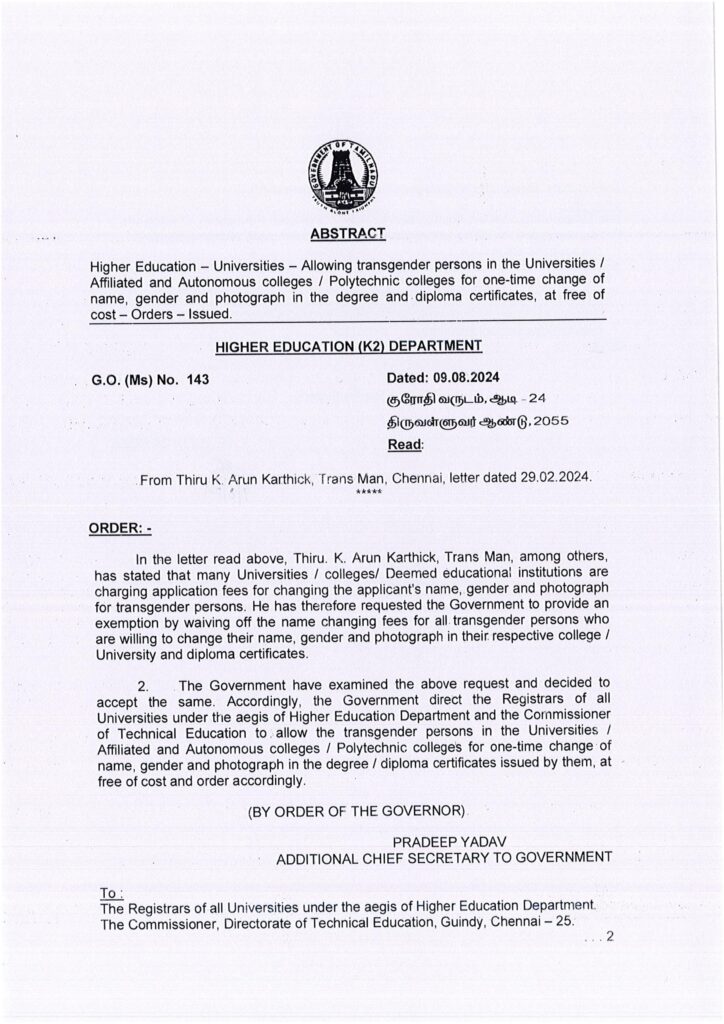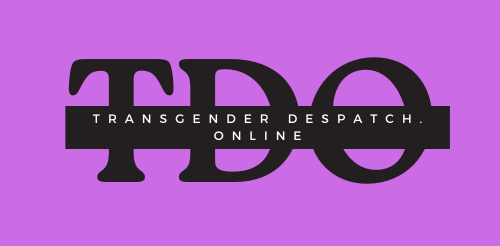|
Getting your Trinity Audio player ready...
|
Further to a letter dated 29 February, 2024, submitted by trans person K Arun Karthick to the Higher Education Department, the Tamil Nadu government has now released an order dated 9 August 2024 providing for free change of name, gender and photographs in degree / diploma certificates. The one-time fee waiver will apply to all Universities, affiliated and autonomous colleges, and polytechnic colleges under the Higher Education Department and the Commissioner of Technical Education.

While sharing the copy of the GO with community members, Arun Karthick — currently a member of the Tamil Nadu TG Welfare Board — pointed out that he has been trying to change name and gender markers in college degree certificates for the past one-and-a-half years, but each college or University has different rules, and certain colleges outright deny the right to change identity markers on certificates. He, along with other community members, have been petitioning the Higher Education department to issue orders in the matter, which has finally come into place. Arun also mentioned that this step will significantly help those who are unable to get jobs due to the “mismatch” in ID and educational documents.
It is yet to be seen whether any rules or other obstacles will be put in place for the successful implementation of the order.
How the presence of a functioning transgender welfare board has been a catalyst for these changes
In every other state, transgender persons have been struggling to access these basic rights (which were supposed to be “guaranteed” by the hollow Transgender Persons Protection of Rights Act 2019. While in Tamil Nadu too a significant portion of rights pertaining to education, employment and reservations are being secured through courts, the presence of a transgender welfare board occupied by transgender individuals, is to a certain extent able to participate in the executive of the government. And with great difficulty bring changes in essential government services.
On 5 January 2024, through an order in WP 12606/2023 (EDN-RES), hearing a transgender person’s petition against Manipal University for securing changes in his degree certificate, the Karnataka High Court stated the following:
“At this stage, since it is brought to notice of this Court that there are innumerable such instances awaiting consideration before Universities/Educational Institutions, it is observed that would be appropriate for said authorities to process applications for change of name and gender upon receipt of requests keeping in mind ratio laid down by Hon’ble Supreme Court in NLSA’s case (supra) and this Court in Christina Lobo’s case (supra) instead of driving all applicants to Court for securing directions.”
Similarly, in my own case (WP 9961/2023) against Tata Institute of Social Sciences, Mumbai for the same matter, the Bombay High Court highlighted that the University and the State of Maharashtra have not made any provisions for document changes, and are in violation of all of our rights under Article 21. The order, dated 25 April 2023, states:
“There is absolutely no reason why the online forms on the website of the 1st Respondent and indeed every other educational institution that is or are subject to our writ jurisdiction should not have a form for precisely such changes, i.e., noting a
change in name and a change in gender. It is for the 1st Respondent to make this change on the 1st Respondent’s website and for the 2nd Respondent State Government to issue the necessary instructions to all similar educational institutions across Maharashtra.”
Till date, no actions have been taken by either State in securing these rights guaranteed through the constitution and affirmed in constitutional courts time and again. And in the absence of functioning transgender welfare boards (with active and committed members of the community) in both these states — Karnataka and Maharashtra — it falls on the individual petitioners and community members to keep praying and petitioning, offering court orders only to hear that there are no ‘government orders’.
(At the time of publication I have reached out to Arun Karthick for a copy of the original letter submitted to the Education Department. The post will be updated once it is received.)
